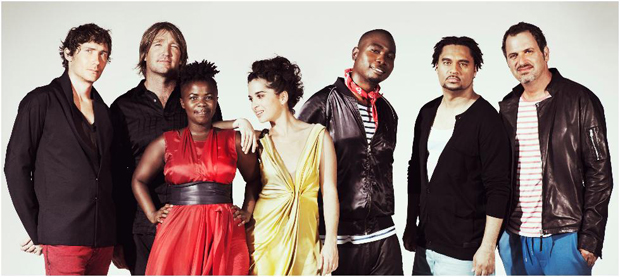
Zimbabwe barred the South Africa band Freshlyground from entering the country.
Members of the South African band Freshlyground were denied entry to Zimbabwe just hours before they were set to play at the closing night of the Harare International Arts Festival (HIFA) last week. The county’s political leaders “have yet to find a sense of humour” the band said.
The group was turned away at Harare International Airport. They were told there was no official reason given or required for sending them back home.
The state-owned daily, The Herald, has subsequently quoted regional immigration officer Francis Mabika saying the band did not have valid work permits. However, organisers at HIFA confirmed in a statement that all the performers at this year’s festival, including Freshlyground, had made payment and received clearances from the National Arts Council, and had obtained temporary work permits.
It is believed the group’s 2010 song Chicken to Change, which accuses president Robert Mugabe of being too afraid to relinquish power, is the primary factor for Freshlyground being turned away even though the song is almost four years old. Days after it first hit airwaves, Freshlyground’s visas to perform at a concert at the Wild Geese Lodge in Harare were revoked. The Zimbabwean authorities do not seem to have changed their minds about the message in the music.
The catchy tune starts off praising Mugabe for being a “superhero” and “noble” in his early years but then takes a critical look at his rule. The accompanying video, which was made in collaboration with the satirical political cartoon show ZANEWS, features a caricature of Mugabe cruising the streets in a limousine, reading Bob’s Times and ignoring his surroundings, save for winding down his window when his car runs over a chicken to observe what appears to be poor people on the side of the road holding other chickens, and then rolling it back up.
Towards the end of the song, lead singer Zolani Mahola concludes with: “You promised always to open the doors for us. Indeed it is you and only you who sleeps with the key. You are chicken to change,” as Mugabe’s head transforms into a chicken’s in the back seat of the vehicle. The rooster is symbolic as it is on the logo of Mugabe’s party, ZANU-PF, which has ruled Zimbabwe for more than three decades but was also a way of depicting poverty in the country because poultry was used as a currency during hyperinflation.
In an interview with Public Radio International (PRI) Mahola explained the crisis in Zimbabwe during the mid-2000s inspired the band, which has one Zimbabwean member in flutist Simon Atwell, to write the song. “It’s been very obvious to see the degradation and how bad the situation is, and how fearful people had become, more and more, under the government of Mugabe. And so, we wrote the song,” Mahola said.
Their approach contrasts with the overall stance coming out of South Africa, especially from political figures, which has been to sidestep the Zimbabwean issue. Although South Africa is home to more than a million Zimbabweans who fled their homeland, the country’s politicians have refused to condemn Mugabe. Instead they have opted for quiet diplomacy, the term coined during Thabo Mbeki’s presidency, which essentially referred to ignoring the Zimbabwean problem.
The artistic corner has also been relatively silent on Zimbabwe apart from DJ Cleo, a kwaito performer, who was banned from performing in Bulawayo in 2006 after he questioned Mugabe’s economic management. Freshlyground, whose music is known for being uplifting and includes the 2010 World Cup anthem Waka Waka, are unlikely candidates to take up the cause but as their bass player, Josh Hawks, explained to PRI, they are willing to be advocates on occasion. “We’re musical-political as opposed to political-musical. But, we are affected by what goes on around us.”
Apart from a few tweets on their departure and a brief statement, the band have refused to comment further on the incident but assured supporters in Zimbabwe they remain committed to visiting the country again. Freshlyground had previously played in Zimbabwe at HIFA in 2004 and the National Arts Merit Awards in 2009 but have not been back since.
Their statement reads: “The band are hugely disappointed at the missed opportunity to return to one of their favourite performance venues, and is left saddened that once more Freshlyground were unable to connect with their fans in Harare. Freshlyground remain undeterred however, and hope that in the not too distant future will be allowed to celebrate a love of music and a freedom of expression with the people of Zimbabwe.”
HIFA’s director Manuel Bagorro called it a “sad day” for Zimbabweans and the festival organisers refunded tickets to the closing night, which were valued at £14 each. They also claim to have received an assurance from the government that the group would be allowed back into Zimbabwe in future.
Freshlyground was not the only source of controversy at this year’s HIFA. A play titled Lovers in Time caused a stir because the two spirit mediums from the 1800s switch sexes and race as they come back to modern Zimbabwe. The final showing of the play was delayed by half-an-hour and played out in with police present.
This article was posted on May 13, 2014 at indexoncensorship.org




